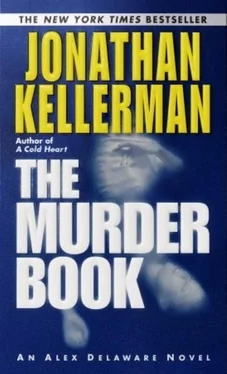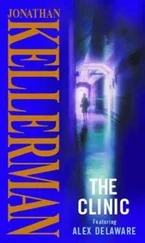Rrrrring.
My "hello" was breathless.
"What, you in the middle of working out?" said Milo.
"I'm in the middle of nothing. What's up?"
"I can't locate Schwinn, but I might've found his old lady."
"First name Marge? Mecca Ranch in Oak View?" I said.
His exhalation was a protracted hiss. "Well, well, well, someone's been a busy worker bee."
"More like a drone. How'd you find her?"
"Exemplary detective work," he said. "I got hold of Schwinn's retirement file- a naughty thing, so this stays between you and me."
"His pension checks went to the ranch?"
"For the first fifteen years after he left, they went to an address in Simi Valley. Then he switched to a post-office box in Oxnard for two years, then the ranch. He's not listed in any DMV files, but the address cross-referenced to Marge Schwinn. I just called her, got a machine, left a message."
"No DMV listing for him," I said. "Think he's dead?"
"Or he doesn't drive anymore."
"An ex-cop who doesn't drive?"
"Yeah," he said. "True."
"Suburban life in Simi followed by a two-year POB interlude before the ranch. That could be divorce, intervening lonely bachelorhood, remarriage."
"Or widowhood. His first wife was named Dorothy and she stopped being a beneficiary when he moved to Oxnard. Two years later, Marge came on." He paused. "Dorothy… I think he mentioned her name. It's getting hard to tell what I remember and what's wishful thinking. Anyway, that's it, for now."
I recounted my time in the library, what I'd learned about the Cossacks.
"Rich kids stay rich," he said. "Big surprise. I also looked for Melinda Waters. She's on no state files, and neither is her mother, Eileen. That may not mean much if she got married and/or Mom got remarried and they both changed their names. I wish I knew the name of Melinda's Navy dad, but I never learned it. The guy had shipped out to Turkey, good luck tracing that. I did locate Bowie Ingalls, and he's definitely dead. Nineteen years dead."
"A year after Janie," I said. "What happened?"
"Single-motorist vehicular accident up in the hills. Ingalls plowed into a tree and went through the windshield. Blood alcohol four times the legal limit, dozen Bud empties in the car."
"Up in the hills where?"
"Bel Air. Near the reservoir. Why?"
"Not that far from the party house."
"So maybe he was reminiscing," he said. "The facts still say drunk driver. The whole Cossack angle was pure supposition. For all I know, Janie and Melinda went to a whole other party. Or Schwinn was right and there was no Westside link at all, they got picked up by a psychopath and slaughtered nearer to the dump site. I'm tired, Alex. Gonna head home."
"What's the plan with Marge Schwinn?"
"She's got my message."
"And if she doesn't return it?"
"I'll try again."
"If Schwinn is dead, maybe Marge sent the murder book," I said. "She could've come across it in his effects, along with a reference to you and me-"
"Anything's possible, my friend."
"If you do reach her, mind if I tag along?"
"Who says I'm visiting her?"
I didn't answer. He said, "What, you've got nothing better to do?"
"Not a thing."
He humphed.
"Robin called," I said. "We talked."
"Good," he said, putting a question mark on the end of it.
I swerved back into safe territory: "By the way, did you have time to run the prints on the murder book?"
"Just one set that I can see."
"Mine."
"Well," he said, "I'm no ace powder man, but I have printed you, and those whorls look familiar."
"So whoever sent it wiped it clean," I said. "Interesting. Either way."
He knew exactly what I meant: a careful cop, or a fastidious, taunting killer.
"Whatever," he said. "Nighty-night."
"Have some sweet dreams, yourself."
"Oh, sure. Here come the sugarplum fairies."
Ididn't expect to hear from him anytime soon, but the following morning at eleven, he showed up at my front door, wearing a navy windbreaker over a plaid shirt and baggy jeans. Below the jacket, his gun bulged his waistline, but otherwise he looked like a guy with a day off. I was still in my robe. No call, so far, from Robin.
"Ready for fresh air?" he said. "Horse manure? All of the above?"
"The second Mrs. Schwinn got back to you."
"The second Mrs. Schwinn didn't, but I figured what the hell, Ojai's pretty this time of year."
A reflexive "Ah" rose in my throat and stuck there. "I'll get dressed."
"That would be best."
He said, "The Seville's nice on long drives," and I obliged. The moment I started the engine, he threw back his head, shut his eyes, covered them with a handkerchief, let his mouth drop open. For the next hour, he dozed in the passenger seat, opening his eyes periodically to gaze out the window and appraise the world with distrust and wonder, the way kids and cops do.
I didn't feel conversational, either, and I played music for company. Some old Oscar Aleman cuts from the Buenos Aires days, Aleman wailing away on a diamond-bright, nickel-silver National guitar. The route to Oak View was north on the 405, transfer to the 101 toward Ventura, then an exit on Highway 33. Ten more miles on two lanes that sliced through pink-gray mountains but rose barely above sea level, took us toward Ojai. Ocean moisture hung in the air and the sky was cottony white above the horizon, then slate-colored strata where the sun should have been. The stifled light brought out the greens, turned the world nuclear-blast emerald.
It had been a few years since I'd been here- chasing down a psychopath bent on revenge and meeting up with an impressive man named Wilbert Harrison. I had no idea if Harrison still lived in Ojai. A psychiatrist and a philosopher, he'd taken a reflective view of life, and given the violence I'd introduced him to, I could see him moving on.
The first few miles of Highway 33 were insulted by slag fields, oil rigs, rows of metallic coils that crowned the cable-and-pylon salad of an electrical plant like so much oversize fusilli . Soon after that everything turned woodsy and Ojai-heterogenous: cute little cabins graced by meticulous stone walls and shadowed by live oaks and pines, cute little shops selling homemade candles and fragrances. Massage clinics, yoga institutes, schools that would teach you how to draw, paint, sculpt, find inner peace, if only you'd let them into your consciousness. Mixed in with all that was the other side of small-town life: rusty mobile homes be-hind barbed-wire fencing, bait-and-tackle sheds, trucks on blocks, dusty homesteads with one or two hollow-bellied horses nosing the dirt, crude placards advertising beef jerky and homemade chili, boarding stables, modest shrines to the conventional God. And everywhere the hawks, huge, relaxed, confident, circling in lazy predatory arcs.
Mecca Ranch was on the west side of 33, announced by nailed-on iron letters in a pine slab, the sign bordered by cactus and some sort of wild grass. A left turn up a barely paved road lined with scraggly birds of paradise in poor flower, took us five hundred yards into low, gentle hills that topped off at a couple of acres of gravel-colored mesa. Off to the right was a corral fashioned from iron posts and wooden crossbeams, more than big enough for the five brown horses grazing. Sleek, well-nourished steeds. They paid us no attention. Directly behind the enclosure were several unhitched horse trailers and a bunk of paddocks. Up at road's end, the birds of paradise were planted more closely together and better tended, and the orange-and-blue blossoms led the eye to a small, flat-roofed salmon-colored house with teal green wood trim. Parked in front were a ten-year-old brown Jeep Wagoneer and a Dodge pickup of the same color and vintage. A transitory shadow washed over the corral- a hawk orbiting so low I could see the surgical curve of its beak.
Читать дальше












